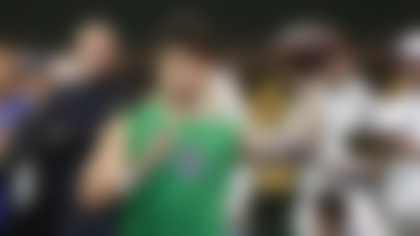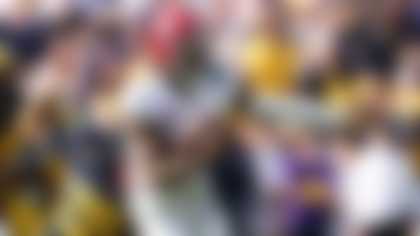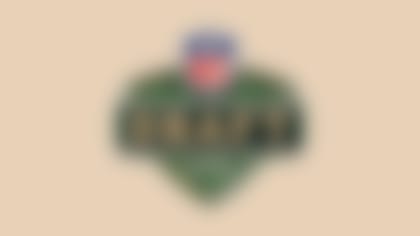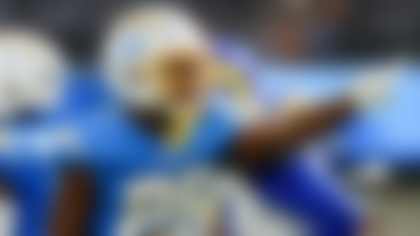Football, hockey, rugby. Violence is part of the game in many sports.
But when athletes cross the line, it can attract the attention of authorities - sometimes from within their sport and in other cases from criminal prosecutors.
The punishment of four current and former members of the New Orleans Saints for participating in a cash-for-hits bounty system that targeted opponents is the latest example, but not the only one.
A look at some other memorable cases from around the world of sports.
Aug. 22, 1965: Juan Marichal hits John Roseboro in the head with a bat:
After a high and inside pitch by the Dodgers' Sandy Koufax, Roseboro's return throw whizzed close to Marichal's ear. Roseboro, his mask still on, moved toward the Giants' Marichal, who then swung his bat and hit Roseboro on the head. The attack opened a bloody, two-inch gash. Roseboro grabbed Marichal, both benches emptied and a 15-minute scuffle ensued. Marichal was ejected and apologized the next day. Roseboro left the game at Candlestick Park with a blood-soaked towel pressed against his head and returned to the lineup three days later.
Penalty: Marichal was suspended for eight games (he missed two starts) and fined $1,750 by the National League. Roseboro later sued Marichal for $110,000 in damages. The case was settled in 1970, with Roseboro reportedly receiving $7,500.
1974: British & Irish Lions use the "99" call to wreak rugby havoc in South Africa:
During their 1974 tour of South Africa, the British & Irish Lions were not going to be intimidated - in fact, quite the reverse. When a player was targeted by the Springboks, he would shout "99," a call to arms for Lions players, triggering a mass retaliation by his teammates. The Lions' thought process: "If the referee sends one of us off, he'll have to send all of us off." It worked. In one of the most violent rugby matches ever - later christened "The Battle of Boet Erasmus" - there is famous footage of Lions full-back JPR Williams running halfway down the field to launch himself at Johannes van Heerden. There were scuffles all over the field, sparked by the "99" call.
Penalty: No Lions player was ejected during the tour and the visitors returned home with a 3-0 win in the test series.
Dec. 9, 1977: Kermit Washington punches Rudy Tomjanovich in the face:
With a fight already going on at midcourt in a game between the Los Angeles Lakers and Houston, the Rockets' Tomjanovich ran in to try to play peacemaker. Instead, he got one of the worst shots in sports history - a right hand from Washington, forever known around the NBA as "The Punch." Tomjanovich was unconscious and bleeding, eventually needing multiple operations to repair facial fractures. He also suffered a concussion and other serious injuries. Tomjanovich returned the next season, though was never the same player again.
Penalty: Washington was fined $10,000 and suspended at least 60 days (26 games). At the time, the suspension was the longest in NBA history.
Aug. 12, 1978: Jack Tatum's hit paralyzes Darryl Stingley:
In a preseason game, Oakland's Tatum, considered one of the NFL's hardest hitters, and New England receiver Darryl Stingley collided as Stingley was running a crossing pattern. The receiver lowered his helmet to protect himself and hit Tatum's shoulder pad. The force of the hit fractured two vertebrae in Stingley's neck and severely damaged his spinal cord, leaving him a quadriplegic.
Penalty: No penalty flags were thrown and Tatum was not disciplined.
Jan. 25, 1996: Eric Cantona goes after a fan:
Manchester United's Cantona already had a checkered record when he was ejected for a retaliatory kick at a Crystal Palace defender who had pulled his shirt. As he trudged along the sideline, Cantona suddenly jumped feet-first over the advertising boards at Palace fan Matthew Simmons. The pair traded punches before Cantona was hauled away and escorted toward the tunnel by teammate Peter Schmeichel.
Penalty: Cantona was arrested by police and convicted of assault, although he successfully appealed a two-week jail sentence and instead completed 120 hours of community service. United suspended Cantona for the rest of the season and the Football Association extended the ban to eight months - a punishment that was made worldwide by FIFA. Cantona also lost the captaincy of the France national team over the incident and never played for his country again. The player later said he was wrong to attack Simmons but acknowledged that it had given him "a great feeling."
April 21, 2001: Roy Keane punished for foul, then punished again:
One of soccer's most colorful characters, Keane often made headlines for the wrong reasons. One challenge contributed to the end of a rival's career and tarnished his own. Keane's feud with Alfie Inge Haaland began while the Norwegian was playing for Leeds in 1997. Haaland actually started things with a tackle that put Keane, then a midfielder for Manchester United, out for several months.
Later, in his autobiography, Keane admitted he wanted to get back at Haaland for accusing him of feigning the injury. Payback came in April 2001, with Keane launching a two-footed, knee-high challenge on Haaland, who was by then playing for Manchester City.
Penalty: Initially, Keane was banned for three matches. But the English Football Association charged Keane with bringing the game into disrepute in September 2002 when Keane later admitted to deliberately setting out to injure Haaland. "I'd waited almost 180 minutes for Alfie, three years if you looked at it another way," Keane said in his ghostwritten book. "I'd waited long enough. I hit him hard. The ball was there (I think). Take that." Under a ruling that the vicious tackle was "improperly motivated," in October 2002 Keane was banned for a further five games and fined a record 150,000 pounds (then $234,000).
Feb. 21, 2000: Marty McSorley hits Donald Brashear in the head with his stick:
With 3 seconds left in a game in Vancouver, British Columbia, the Bruins' McSorley, a notorious enforcer, swung his stick using both hands and hit Brashear in the head. The player fell backward and hit his head on the ice, was unconscious for a brief time, and had a concussion and memory lapses. He returned to play several weeks later.
Penalty: McSorley was suspended indefinitely by the NHL, missing the final 23 games of the season. On Oct. 4, 2000, a Canadian court found him guilty of assault and placed him on probation with no jail time. After the conviction, the suspension was extended to a full year, and McSorley never played in another NHL game.
Nov. 19, 2004: Pacers-Pistons fight spills into stands:
The most infamous brawl in NBA history - Malice in the Palace - started when Indiana's Ron Artest (now Metta World Peace) fouled Detroit's Ben Wallace late in the game. Wallace shoved back, other players got involved and Artest wound up lying on the scorer's table. He put on a pair of headphones at one point, while others on the court continued a battle of mostly words for over a minute. Then a fan threw a drink on Artest, prompting him and teammate Stephen Jackson to head into the stands. "Someone started trouble," Artest said years later, "but I ended it."
Results: Nine players were suspended for 140 games. Pacers: Artest, 73 games; Jackson, 30 games; Jermaine O'Neal, 25 games; Anthony Johnson, 5 games; Reggie Miller, 1 game. Pistons: Wallace, 6 games; Chauncey Billups, Elden Campbell and Derrick Coleman, 1 game each.
July 9, 2006: Zinedine Zidane's head butt:
Zidane had already ended his international career once in inglorious circumstances, but that was nothing compared to how he finally left the game. Persuaded to rescind the retirement he announced after France was eliminated from the 2004 European Championship, Zidane helped carry his country to the 2006 World Cup final and a meeting with Italy at Berlin's Olimpiastadion. Zidane had already said the game would be his last in professional soccer and he put France ahead with a seventh-minute penalty kick. A tense game was headed toward a penalty shootout after Italy had tied the game when, seemingly without provocation, Zidane turned toward Italy defender Marco Materazzi and planted a head butt on his chest. Zidane was sent from the field in disgrace, passing within touching distance of the World Cup trophy he was now unable to play for. With Zidane unavailable, France lost the shootout 5-3.
Penalty: FIFA banned Zidane for three matches but the punishment was meaningless since he had retired. Zidane instead agreed to spend three days working with children as part of a FIFA humanitarian project. Zidane said he knocked Materazzi to the ground because the Italian had insulted his sister. His opponent later confirmed Zidane's version of events.
July 11, 2010: Nigel de Jong kicks Xabi Alonso:
Nigel de Jong chose the highest-profile match in world soccer for a blatant foul.
In a 2010 World Cup final criticized for the rough play of the Netherlands players, the tough Dutch midfielder delivered a kick with his right foot straight into the chest of his Spanish counterpart, Xabi Alonso.
Penalty: English referee Howard Webb handed out only a yellow card to De Jong, to the amazement of Alonso, Spain's team and a global audience of billions. "One of the things I would change is the color of the card for De Jong's tackle," Webb said days later. "Having seen it again from my armchair several times in slow motion and from different angles, I can see that it was a red-card offense." In the end, Alonso had the last laugh as Spain won the title.



